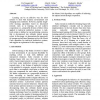Free Online Productivity Tools
i2Speak
i2Symbol
i2OCR
iTex2Img
iWeb2Print
iWeb2Shot
i2Type
iPdf2Split
iPdf2Merge
i2Bopomofo
i2Arabic
i2Style
i2Image
i2PDF
iLatex2Rtf
Sci2ools
114
Voted
ICRA
2002
IEEE
2002
IEEE
The Necessity of Average Rewards in Cooperative Multirobot Learning
Learning can be an effective way for robot systems to deal with dynamic environments and changing task conditions. However, popular singlerobot learning algorithms based on discounted rewards, such as Q learning, do not achieve cooperation (i.e., purposeful division of labor) when applied to task-level multirobot systems. A tasklevel system is defined as one performing a mission that is decomposed into subtasks shared among robots. In this paper, we demonstrate the superiority of average-reward-based learning such as the Monte Carlo algorithm for task-level multirobot systems, and suggest an explanation for this superiority.
ICRA 2002 | Monte Carlo Algorithm | Popular Singlerobot Learning | Robotics | Task-level Multirobot Systems |
| Added | 15 Jul 2010 |
| Updated | 15 Jul 2010 |
| Type | Conference |
| Year | 2002 |
| Where | ICRA |
| Authors | Poj Tangamchit, John M. Dolan, Pradeep K. Khosla |
Comments (0)

